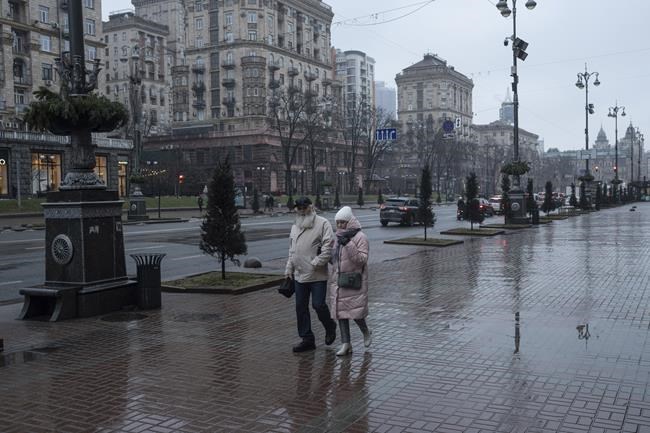As Ukraine nears a grim anniversary in its war with Russia, the Red Cross says residents in the strife-torn country are adapting to a new normal of cannibalized houses, intermittent electricity, air raid sirens and rocket attacks.
The agency says residents have embraced the hard reality that with scarce resources going to the war, they must turn to one another to get things done.
Saturday marks the second anniversary of Russia’s invasion of Ukraine.
In the city of Irpin on the outskirts of Kyiv, the devastation from Russia's temporary occupation in the early days of the invasion remains. Shopping centres are flattened, houses burned, an apartment building stands gutted.
Another highrise appears intact but closer inspection reveals gaping holes in windows and a sheet of plywood nailed over the front door.
"Millions of people have lost their near and dear ones, their homes and all the property they had. They have to start their lives from scratch," says Ukrainian Red Cross director general Maksym Dotsenko.
Inside Ukraine, fighting, air raid sirens and shelling are still an everyday reality to millions. Winter conditions have made it even more difficult, with many houses damaged or destroyed and water, gas and electricity limited.
Much of the international aid has been designated for the military, rebuilding economic infrastructure and urgent humanitarian aid.
That means Ukrainians dealing with the impact of their homes being destroyed or damaged by rocket attacks are on their own.
In response, they turn to each other.
Dasha Galayda and her group of volunteers from the organization Brave to Rebuild spend their evenings and weekends helping residents of Kyiv remove the rubble and repair homes that have been damaged by Russian rocket attacks.
"Sometimes we can save some of the items," Galayda, 31, an interior designer, said in an interview with The Canadian Press in a downtown Kyiv coffee shop.
"But there are places that are ruined almost completely, and we are just cleaning.
"There are some places where we can help to rebuild, so we are trying to help with windows and doors and make new roofs so we're trying to combine both of them."
Galayda said about 50 volunteers show up every weekend to help out.
Although it's possible to remove rubble, the bigger challenge is finding money for building material.
"We try to help everybody who comes to us," she said.
"Sometimes people ask for tools or maybe materials and we don't have such things, but we can help to collect them. It's according to the emergency I think."
Ihor Michalchyshyn, the CEO and executive director of the Ukrainian Canadian Congress, said in Ukraine it's a matter of neighbours helping neighbours.
Sometimes, it's set to music: young people play techno while clearing up the ruins.
"They were sort of like raves but were sort of a cleanup rave," he said.
"A group of young people would go to a home or go to a site to sort of play music while they were cleaning up rubble and clearing debris for people.
"Many homes in communities that have been hit are sort of in this half-state of openness and the heat issue is a huge one, especially if it's been a rough winter. I've seen and heard about many ways that Ukrainians are sort of helping one another."
Since February 2022, Global Affairs says Canada has committed more than $2.4 billion in military assistance donations to Ukraine.
An additional $96 million in development assistance was provided to support Ukraine's emerging needs and $320 million to respond to urgent needs such as food, safe drinking water, sanitation services, emergency health care and temporary shelters.
Michalchyshyn said both Canada and the international community could provide more.
"Ultimately military aid will help them win the war and the sooner we win the war the sooner things return to normal and people can rebuild, but there are many, many things on the way that need to be done," he said.
Galayda said she and her team will keep working.
"Concrete and bricks can tell you nothing, but people and their stories are really touching," she said.
"When you hear the stories, it breaks your heart every time."
This report by The Canadian Press was first published Feb. 19, 2024.
Bill Graveland, The Canadian Press




